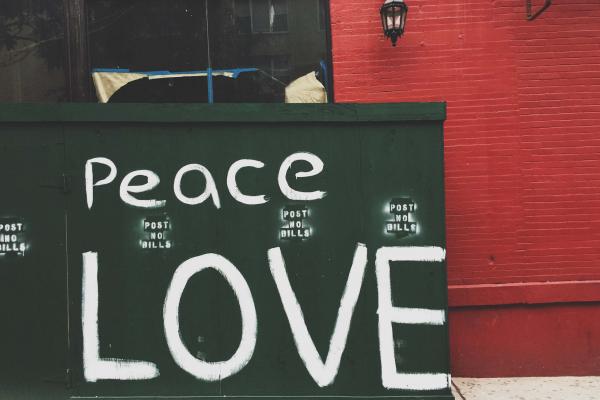Editors note: This is part seven of an eight-part series exploring the eight Jesus questions all of us must face, highlighted in Jim Wallis's new book Christ in Crisis: Why We Need to Reclaim Jesus (HarperOne), available now. These next eight weeks will help us go deeper than the headlines, to find our way back to Jesus in the midst of this intensive and exhausting news cycle.
Want to hear this in an audio format instead? We just launched an eight-episode podcast series called Reclaiming Jesus Now that features Allison Trowbridge and William Matthews speaking with Jim Wallis about these questions and their relevance today.
“Blessed are the peace lovers,” for they shall be called righteous — on the right side. They will be known for what they will not do, for being against war, for preferring peace, for not fighting, for staying out of conflicts.
But that is not what Jesus said. The text in Matthew 5:9 says, “Blessed are the peacemakers, for they shall be called the children of God.” Making peace is not the same as avoiding conflicts. Making peace means moving into conflicts, trying to resolve them, to uncover their causes, to restore relationships, to heal the wounds, to seek a just peace. Peacemaking is conflict resolution. A positive sign I see is how many young people I meet who are being drawn into the vocation of conflict resolution as both a science and an art — based in a way of life — in a lifestyle of non-violence.
Human conflict is inevitable because we're human, both in relationships and in institutions like nations. How we resolve those conflicts is the issue. When you think about it, most of our conflicts are resolved without resorting to violence. So, the question we should seek to answer as followers of Jesus is how to increase the number of conflicts that are resolved nonviolently. Jesus recognizes how difficult and important this work is, which is why he specifically recognizes those who resolve human conflicts as children of God.
We all love peace, and when there’s a lack of peace we tend to blame other people rather than ourselves. Peacekeeping, on the other hand, sounds good. But keeping the peace under an oppressive status quo and accepting things as they are isn’t truly peace. What Jesus is calling us to is an active process of solving conflicts without violence and thereby making peace.
I love what Andrew Klager has said about the difference between conflict and violence:
But violence is not the same as conflict. Conflict provides the space to air our grievances and expose injustice; non-violence entails ending conflict by ending its causes without succumbing to the allure of violence. Nonviolence requires, “the willingness to face conflict head on, to resolve it, and to make it a link in the chain of a new process,” explained Pope Francis.
It should not be difficult for followers of Jesus to recognize that making war isn’t what the gospel calls us to do. As Dorothy Day once said:
You just need to look at what the Gospel asks and what war does. The Gospel asks that we feed the hungry, give drink to the thirsty, clothe the naked, welcome the homeless, visit the prisoner and perform works of mercy. War does all the opposite. It makes my neighbor hungry, thirsty, homeless, a prisoner and sick. The Gospel asks us to take up our cross. War asks us to lay the cross of suffering on others.
Is this path of nonviolence naive in a world of nuclear weapons, armed extremists, and school shootings? Of course, to talk about the importance of peacemaking and active nonviolence is often to be accused of being unrealistic. But I would suggest that it is naive to think that war and the quick recourse to violence is the answer to our human conflicts. If one looks at history, military conflict doesn't usually resolve conflicts, especially as we have moved to the deep threat posed by weapons of mass destruction. War often exacerbates conflicts instead and causes both horrific “collateral damage” in civilians killed and displaced and decades worth of unintended consequences.
Opposing the easy answer of war is good and necessary for followers of Jesus, but it isn’t enough. Rather than just being against a war, we should always strive to go deeper and understand the real issues at play that are fueling the current or potential conflict. True active nonviolence and peacemaking means taking the problems that war purports to solve and solving them in different and better ways. As William Matthews explained in this week’s conversation for the Reclaiming Jesus Now podcast on the “Peacemaker Question:”
That takes a very conscious effort to look at a situation, not just from the top down but from the ground up ... I think just that simple shift is what makes us peacemakers versus warmongers ... instead of going, “this is what we think Iraq needs, this is what we think Syria needs,” actually let's talk to Syrians about what they need … Peace[making] takes years. It's not an overnight thing, but it's painstaking, it’s inch by inch, little by little, building trust and equity and bridges.
Yet while it does often require more patience than war, the truth is that active peacemaking saves both money and lives. It is not a utopian notion but an approach that is both practical and moral.
The biggest obstacle we face in seeking to become a society of peacemakers is therefore not practical or logistical, but moral and ethical. One might even call the fact that we haven’t gotten there a failure of imagination. As Allison Trowbridge put it for our podcast conversation: “We've become so accustomed to war being a solution for conflict that we can hardly imagine a different solution. And yet, 200 years ago, we couldn't imagine a world without slavery. So how do we begin to imagine forward human society without the constant wars and genocides that surround us?"
In some ways, the problem boils down to an unwillingness to invest and pay the cost for peace. As a society, we invest so much more money, time, and lives in waging war than we do in waging peace. It's going to take a commitment to waging peace that’s morally equivalent to the one that currently exists for waging war if things are ever going to change. We need to be willing to sacrifice the way soldiers are expected to sacrifice, to stake our lives on the cause of peacemaking.
Our commitment to peacemaking as followers of Jesus must extend beyond the realm of war and peace. Our call to resolve conflict must also be reflected in how we talk with each other and to our political opponents. It must be reflected even in the difficult conversations we have with friends and family, especially when we have strong disagreements. The state of our civil discourse in this country is as bad as it’s been in decades. Cornel West says that “we're living in a moment of spiritual blackout, which is the relative eclipse of decency, honesty, and integrity.”
The greatest concern I have about the presidential rallies we see in the news is the way the president talks about the people that he doesn’t like or agree with — and the way his crowds respond so enthusiastically to his ugly and hateful words that can ultimately lead to violence. The way our media systems and political extremes increasingly talk about their opponents and entire groups of people is more and more warlike. Our call here goes far beyond just being nice, polite, and “civil.” Instead it’s about having the kind of discourse, empathy, and understanding that can lead to conflict resolution instead of exacerbating and escalating our conflicts.
The way of Jesus takes a longer time and deeper approach than the quick solutions that violence and war promise. The painstaking, slow, incremental way to peace is what we should practice in our relationships, our civil discourse, in how we talk in our communities about how to solve problems, in what it takes to bring people together to reform unjust systems, or to educate our children. All of these things take time. At its best, peacemaking is a lifestyle.
Peacemakers are the best hope for reducing violence, avoiding the greatest dangers, halting the biggest threats, and moving things even incrementally in a better direction. They keep open the necessary and vital option of keeping our greatest conflicts from becoming even more bloody. We don't live in a perfect world; it is one that is broken and fallen. Therefore, the role of peacemakers is crucial in keeping our inevitable human confrontations from killing more and more of us.
War is not merely an activity. It is a system supported by economic and political assumptions and by structures that drive us toward conflict, which is then resolved by chosen methods of violence. The history of those systems and assumptions are deeply embedded in the present conflicts we are now confronting and it is those assumptions and those institutions that we must begin to question. Those who do will be called the children of God.
Got something to say about what you're reading? We value your feedback!




